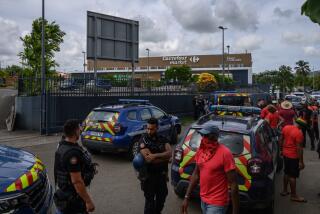850 More Troops Sent to Curb Violence in Zulu Areas : South Africa: State of emergency has failed to end fighting. Additional forces will be deployed before April 26-28 voting.
- Share via
DURBAN, South Africa — After one of the bloodiest weeks in this country’s recent history, the military deployed up to 850 more combat troops Wednesday to violence-scarred Zulu townships of Natal province to enforce a state of emergency, which has so far failed to curb bitter factional fighting.
The reinforcements, drawn from infantry and light artillery reserve units in Natal, bring the total force here to about 2,000 troops. More troops will be deployed April 15 for about a month to cover the volatile province during the April 26-28 elections and their aftermath, the military said.
“The situation is very tense,” spokeswoman Capt. Kim Van Niekerk said in a telephone interview. At least 100 people have been reported killed in township wars since President Frederik W. de Klerk announced emergency rule last Thursday in the tribal Zulu homeland of KwaZulu and surrounding Natal province.
The strife--which usually takes the form of drive-by shootings, arson and massacres of civilians--is part of the intensifying conflict between Zulu followers of Mangosuthu Gatsha Buthelezi’s Inkatha Freedom Party and Nelson Mandela’s African National Congress. The majority of victims this week have been in ANC strongholds.
The death toll has grown dramatically since Buthelezi pledged to boycott the election that his archrival, Mandela, is expected to win. ANC officials in Natal complain that the emergency decree has failed to protect their supporters and to ensure a free election.
In a dramatic display of the problems the security forces face, dozens of police and soldiers looked on as an estimated 10,000 anti-election Zulus defied emergency regulations and marched Tuesday with their “traditional” weapons in Empangeni in northern Natal.
Police said they had decided not to strip the Inkatha protesters of spears, fighting clubs, machetes and knives to avoid a confrontation. The march was peaceful.
Officials from the neutral Independent Electoral Commission reported Tuesday that peaceful and free elections are not possible in KwaZulu and Natal “in the current political climate.”
It cited a “high level” of political intolerance and fear, intimidation, a failure of KwaZulu authorities to assist election officials and the inability of South African police to protect the region.
Hopes that the fighting can be curbed to permit free balloting are now riding on a “peace summit” scheduled Friday morning among key players in the crisis--Mandela, Buthelezi, De Klerk and the Zulu king, Goodwill Zwelithini.
But in a speech Wednesday at the University of Durban, Mandela flatly refused Buthelezi’s demand that the elections be delayed. “There will be no postponement of elections in this province or any part of this province,” Mandela told cheering students. “We will not postpone our freedom.”
Mandela also made a veiled threat that the new black-led government will cut off funding from Pretoria that supports Buthelezi’s one-party regime in KwaZulu, one of 10 “homelands” created under apartheid in the unsuccessful attempt to permanently separate the races. Leaders “not very far from here,” he said, “are not going to get those funds that they have abused and used to kill innocent people.”
Judge Johann Kriegler, head of the electoral commission, also gave no sign of bending to Buthelezi’s demand. “The elections will go on,” he told a news conference. “The few spoilers are not going to frustrate the vast majority of those who want to vote.”
Roelf Meyer, the government’s constitutional development minister, said a delay is not “a viable option.” He told a Johannesburg radio station that “we would run into constitutional problems . . . we would run into political problems, as far as the tensions that would flow from such a decision.”
Buthelezi, a longtime ANC opponent, has insisted that the interim constitution does not provide enough devolution of powers to provinces. He also insists that King Zwelithini, a largely powerless monarch who has often appeared in Buthelezi’s shadow, be guaranteed sovereign powers.
More to Read
Sign up for Essential California
The most important California stories and recommendations in your inbox every morning.
You may occasionally receive promotional content from the Los Angeles Times.














